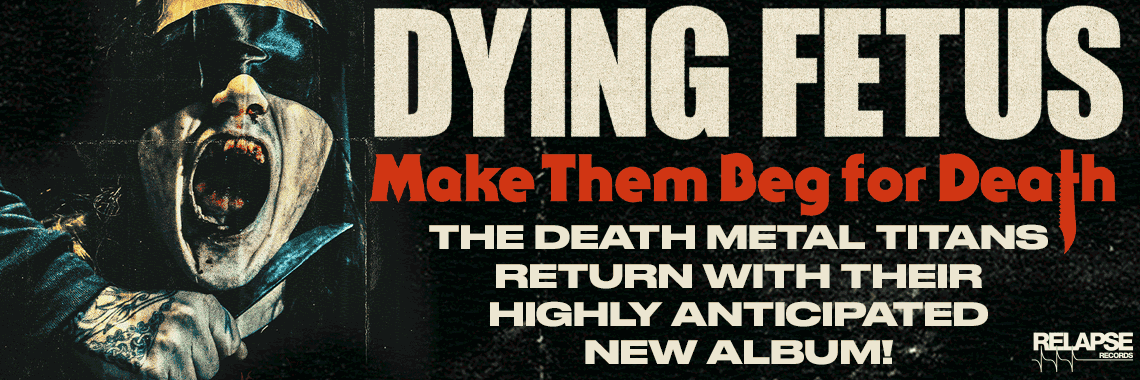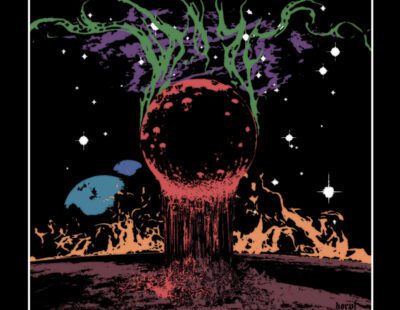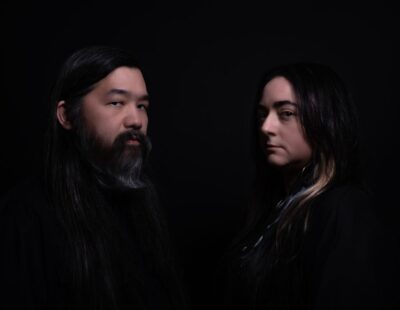We could all stand to learn something from Austin Lunn’s work ethic. In addition to being a full-time family man and co-running a successful brewery, the dude has managed to put out 15 Panopticon releases in the last eight years while also contributing his multi-instrumentalist skills to albums by Seidr, Falls of Rauros, Saor and more.
Staying true to this breakneck creative pace, Lunn is mere weeks away from dropping Panopticon’s sixth LP, the enthralling and resonant Autumn Eternal. The album is a thematic companion to his two previous LPs, but musically, it eschews the “blackened bluegrass” approach in favor of emotionally charged, mournfully melodic black metal (think Winterfylleth meets early Katatonia). We talked to Lunn about creating Autumn Eternal, taking inspiration from nature and being a musician in the often-disheartening environment of the digital age.
Autumn Eternal marks the end of a trilogy that began with Kentucky (2012) and continued with Roads to the North (2014). How are these three albums connected thematically?
It’s strange; it never really occurred to me that it was a trilogy until I finished this album and saw how the story was connected. Kentucky certainly sits on the “political/social commentary” side of things, which I have been moving away from in recent years to focus more on dealing with my own issues and using music as a way to process those thoughts and feelings.
Kentucky was a love letter to home. As I was completing the album, I got the opportunity to do an apprenticeship in Europe as a result of opening a brewery with my brother-in-law. So, I started writing the album to extol the many virtues of my home in Kentucky; to sing the praises of the place I love so much. And as I was finishing it, I was confronted with the idea that I would have to leave if I wanted to provide a better life for my family. There were a lot of implications with that. For many years, I have searched to find my identity and roots, and my community in Louisville and family and friends all over Kentucky became the core of that. After moving around, I felt kind of rootless, like a tree that would just tumble over in the wind. Roads to the North chronicled those changes—[I was] saying thank you to the people who helped strengthen me over the years but also metaphorically walking this road to acceptance. Autumn Eternal is me processing the aftermath of it all…coming to terms with having to redefine myself yet again in my 30s.
What’s the significance of the album title? Did you purposefully write the music to reflect a feeling of “eternal autumn” or did that happen organically?
The title came into my head on an October drive near Flå, Norway, years ago with my wife, Bekah. We were driving around in the mountains and listening to The Morningside, and the music fit so perfectly. I’ve loved bands like The Morningside, Rapture and Agalloch for many years, and I’ve always wanted to incorporate more of that sound into my music. So, as we were driving, I told Bekah that if I ever did a more dark metal-sounding record, that would be its title. It took me five years, but I did it.
Autumn Eternal features less of an emphasis on traditional bluegrass instruments than your previous two albums. Why did you decide to take a more guitar-based approach on this album?
I don’t want to be a one-trick pony, and I certainly don’t want to exploit my own culture by parading it around to the point that my music becomes a caricature of itself. So, for the sake of authenticity, I just record what comes out instead of trying to satiate an expectation based on my previous efforts.
How long did it take you to write Autumn Eternal after Roads to the North was finished?
I started writing the demos for Autumn Eternal before Roads to the North was released [in August 2014], and I had them done by that November. I spent a few months dwelling on the material and then re-wrote some of it, and I wrote a new song for the album during the recording sessions.
In terms of your writing process, do you start with ideas on the guitar or do you write with an entire band in mind?
I’m all over the place. Sometimes I just record random drums to jam to until I catch something I like. Sometimes I write an entire song in my head while I’m at work or walking in the woods. It just depends on how the inspiration hits me. I try not to overthink things too much, but at the same time, I want things to be thought out. Once I’m done with that process, I re-record everything and wrap it up nice and tight with production help from my friends Spenser Morris and Colin Marston.
When do lyrics come into the process?
I like to write lyrics in places that inspire the music. Most of the lyrics [on Autumn Eternal] were written way up north during hikes in the woods. I wrote a lot by this gorge near Tofte, Minnesota. The spot was only a mile or two away from the trailhead, so it was a good place if I wanted a change in scenery. That’s important to me—getting space and solitude to let my mind run a bit.
Where did you take the picture that’s on the album cover?
Bekah took that picture in Flå. It’s a stop on the side of a very scenic road. There’s a spot down by the water where Bek and I camped years ago. I return to that spot every time I go back to Flå for work or personal reasons. It’s very peaceful and has easy access to the forest. Many of the photos from the album are also from the North Shore of Lake Superior, various spots in the Minnesota Northwoods, and places in southern and central Norway. Being born and raised in the south, my life has been pretty full of northern landscapes over the past few years, and that has been something to get used to, but it’s inspiring as well.

Autumn Eternal features guest appearances by Johan Becker (violin) and Petri Eskilinen (vocals). How did these collaborations come about?
Johan and I have a long history of working together. He’s one of the most talented musicians I know. His involvement with this album was a lot less than on Roads to the North, but that’s because he’s been so busy with his band, Vaskula, as well as writing with his other band, Austaras, and doing guest spots for a few bands on the side. He’s a busy man and a good friend.
Petri and I have been, for lack of a better word, pen pals for about 10 years. I found him when I wrote to him long ago and told him how much his band, Rapture, means to me. Their three albums are records I always come back to and cherish more with every listen. So, it made perfect sense to ask him to sing on “A Superior Lament,” which was written on the shore of Lake Superior. He’s a far better singer than me, so I really wanted to have his vocals on that song. I consider it a privilege and an honor, and I’m very thankful for his contribution. Petri is a good man and I look forward to finally meeting him face-to-face and having a beer together after all these years.
There are also some cello parts by Nostarion from Dämmerfarben on one of the songs, and I think he did a great job.
Do you think you’ll return to the trilogy form in the future, or do you want to take it album by album?
I’m not sure what the future holds. I’ve been goofing around in my studio space with some drums [that I can] cut up and write to. I think I want to do things a little more raw and atmospheric next time—revisit some of my older explorations and make things a little less brutal, with more mid-paced black metal sounds rather than melodic death or dark metal influences. I’ll just see where I end up. As long as it’s honest and done solely for the purposes of self-expression and personal gratification, that’s all that matters. I don’t ever want to make a record to “move units” or any of that bullshit. I’m doing my best to keep it sincere.
You’re not doing much press leading up to Autumn Eternal’s release, partly because Roads to the North leaked so early and you weren’t adequately prepared. What’s your take on the “digital landscape” that music exists in today, where it can be so easy for a highly personal, meticulously crafted album to leak months before it’s ready for commercial consumption?
To be honest, I can’t handle the current culture being bred by Internet metal. It’s faceless, demanding, imposing, narcissistic, chest puffing and judgmental. I just don’t want to be a part of it. That’s the reason I do so few interviews…with all the guns blazing, it’s only a matter of time until they get turned on me, and I just want to stay out of it.
When Roads to the North leaked, it was an extremely anti-climactic end to more than a year’s worth of hard work. To bust my ass to make the best record I could and have it leaked in subpar quality and be ridiculed by people, many of whom listened to the first two minutes and hollered, “Next!”…no thanks. I’ll pass on that. If people want my album, they know where to get it. I don’t feel the need to go overboard plastering my ugly mug all over the place. There are a lot better bands out there that deserve the attention more than me anyway, and they can put up with the headaches and heartbreak a hell of a lot better than I can.
What’s the biggest challenge of creating music by yourself?
The lack of outside perspective makes it difficult. I always feel like a self-centered ass asking all of my friends to listen to my records and give me their opinions. But the truth is, after I’ve heard it so many times during the process of working on it, I can’t tell if it sounds good anymore. When you’re in a band, you have other people to bounce ideas off or catch you when you fall. On the other hand, it’s awesome to have an outlet that’s purely based on the perspective of one person. It’s kind of a double-edged sword.
Autumn Eternal is out October 16th on Bindrune Recordings. Check out the video below for a 13-minute teaser.







